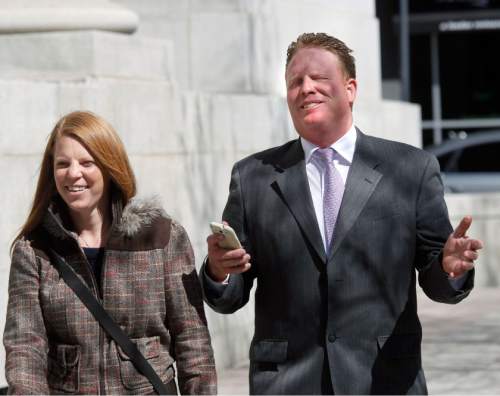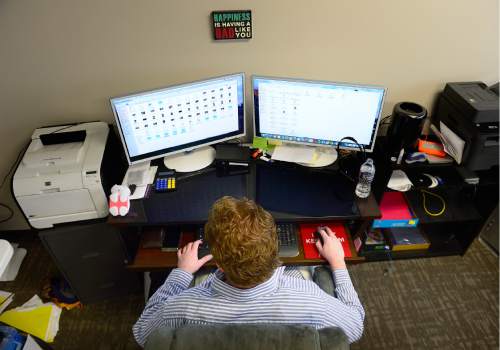This is an archived article that was published on sltrib.com in 2016, and information in the article may be outdated. It is provided only for personal research purposes and may not be reprinted.
Nearly five years after a single charge was first filed, a federal court trial is to begin Monday in the case of St. George businessman Jeremy Johnson, whose criminal case has grown to 86 charges in intervening years and into the middle of one of the biggest Utah political scandals ever.
A jury is expected to be sworn in Monday morning to hear the case against Johnson and two top former employees of his I Works online marketing company and decide whether they are guilty of charges revolving around allegations of bank fraud.
The case has had a long and twisted road in getting to trial, including a failed plea bargain, allegations of prosecutorial misconduct, missing evidence, intercepted private emails and a gag order on participants after Johnson took to social media to denounce what he considered government abuses.
If that's not enough, two of the three defendants are acting as their own attorneys.
"This case presents some real novel legal issues," said Brett Tolman, the former U.S. attorney for Utah who is now in private practice, adding that it could be "entertaining" with two defendants representing themselves.
Johnson has been pushing to go to trial and said, "I am just happy to finally get my day in court, and I wish I could say more, but I am bound by a gag order."
A judge on Saturday night dismissed a last-minute motion from one defendant to dismiss the case over complaints the government was too slow to bring it to trial.
Red personality • Beyond nearly five years of legal back and forth, the events that have really roiled Utah were sparked by Johnson's revelations in January 2013 that then-newly sworn-in Attorney General John Swallow had taken part in an effort to bribe the most powerful senator in the land, then-U.S. Senate Majority Leader Harry Reid, D-Nev., on Johnson's behalf.
Subsequent investigations by county prosecutors — after the Department of Justice mysteriously bowed out — also enveloped former Attorney General Mark Shurtleff. Swallow and Shurtleff now face criminal charges that include some counts related to an alleged pay-to-play scheme in the attorney general's office. Both have pleaded not guilty; Swallow denies there was a bribery effort.
At the center of this hurricane is Johnson, who turned 40 in December. His wavy red hair helps to define his appearance and his personality. He married a fellow redhead, populates his St. George mansion with orange cats and has an email address that begins "royalorangecat."
Johnson is smart but with a personality that can turn rapscallion, highly generous to people he wants to help and extravagant in buying personal houseboats, helicopters and airplanes. He also suffers from attention deficit disorder and acknowledges he can't manage money well.
As trial approached, Johnson dumped his court-appointed attorneys — his third set of lawyers — and opted to represent himself, though experienced criminal defense counsel Greg Skordas remains to advise him. For months, Johnson has been ensconced in a downtown Salt Lake City office surrounded by computer screens wading through evidence, sometimes all night, according to accounts of some who know him.
Chargeback • Johnson's legal troubles began in 2010, when the Federal Trade Commission launched an investigation of his I Works company that was selling information such as how to apply for government grants for personal expenses, how to earn income from Google AdWords and other moneymaking opportunities.
In the largest enforcement action ever pursued by the agency, the FTC sued Johnson in December 2010 in federal court in Nevada, alleging that I Works had taken in at least $275 million, beginning in 2006, by not properly disclosing that additional monthly charges were forthcoming when consumers bought an initial product for a minimal charge.
Credit card companies placed I Works on their lists of companies with high consumer chargeback rates and banks began closing I Works accounts. That prompted Johnson and others to form "shell companies" under the names of employees, family or friends, regulators asserted, so I Works could open new accounts and continue processing cards without disclosing who was really behind them.
The FTC persuaded a judge to seize all of Johnson's assets and those of his companies and then apparently contacted the U.S. attorney's office in Utah about possible criminal charges.
After meeting with the FTC, prosecutors in Utah charged Johnson with one count of mail fraud and then arrested him in the Phoenix airport. An IRS agent later conceded in court testimony that he had not interviewed the consumer before charges were filed.
Johnson spent 96 days in jail before then-U.S. Magistrate Judge David Nuffer allowed him to post $2.8 million in bail from properties put up by family and friends. Nuffer was elevated to a district judge in March 2012 and was assigned the Johnson case.
Out of jail, Johnson began an intense campaign on social media, on the Internet and in the news media that targeted what he viewed as abuses by federal regulators and prosecutors in both cases, an effort that led to a gag order.
Then, toward the end of 2012, Johnson said lead prosecutor Brent Ward began threatening him with indictments against family, friends and other employees if he did not accept a deal in which he would plead guilty to bank fraud and money laundering and receive an 11-year prison sentence.
The plea deal blew up in January 2013, when Johnson insisted that as part of the deal Ward had promised not to indict a list of people Johnson had submitted. The U.S. attorney's office balked at including the list as part of the official record of the case and the deal fell apart and led to new indictments that included four other high-level I Works employees. Defendant Bryce Payne reached a plea bargain last week and charges against Loyd Johnston were dismissed when he claimed he had been promised immunity by Ward.
Missing emails • Since then, as the case lurched toward trial, the defendants — five at one time — have alleged that thousands of emails from a critical period related to the case are missing from evidence; data provided from an I Works server that might contain important evidence can't be accessed; and a prosecution search warrant seized thousands of private emails between Johnson and his lawyers.
"The U.S. attorney's office should be very concerned about accusations that have come out of this case, and there appears to be at least some level of accuracy to those accusations," Tolman said. "In the end, they're going forward, but there are missing documents from information that was seized by the United States government."
The U.S. attorney's office declined to comment, citing the gag order and the start of the trial.
Johnson, meanwhile, when he began acting as his own attorney, had to provide an email address to the court to send and receive documents. It begins: "notguiltyonallcounts."
tharvey@sltrib.com Questions and answers
Where is the trial?
In the federal courtroom of U.S. District Judge David Nuffer in Salt Lake City.
Who is on trial Monday?
St. George businessman Jeremy Johnson, owner of I Works.
Scott Leavitt, former accountant for I Works.
Ryan Riddle, former I Works general manager.
What are the charges?
There are 86 counts, including conspiracy to commit bank fraud, making false statements to a bank, wire fraud, bank fraud, participation in fraudulent banking activities, money laundering and conspiracy to commit money laundering.
What are the allegations?
That Johnson and the others created straw companies and used false information to obtain bank accounts after I Works was cut off because of a large number of consumer chargebacks.
How long is the trial expected to last?
Four to six weeks.
What are the possible sentences if they are convicted?
They range from five to 30 years.











